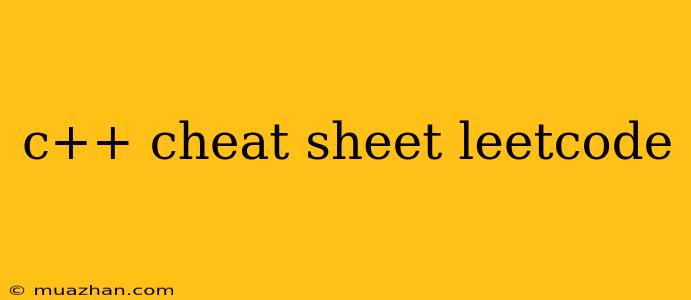C++ Cheat Sheet for LeetCode
LeetCode is a popular platform for practicing coding interview questions. While there are many resources available to learn about C++, here's a cheat sheet tailored specifically for solving LeetCode problems in C++.
1. Essential Data Structures and Algorithms
Data Structures
- Arrays:
vector<int> nums = {1, 2, 3};: Create a vector of integers.nums.size();: Get the size of the vector.nums[i]: Access the element at indexi.nums.push_back(4);: Add an element to the end.
- Linked Lists:
struct ListNode { int val; ListNode *next; };: Define a linked list node.ListNode* head = new ListNode(1);: Create a new linked list node with value1.head->next = new ListNode(2);: Connect the nodes.
- Stacks and Queues:
stack<int> st;: Create a stack.st.push(1);: Push an element onto the stack.st.top();: Access the top element.st.pop();: Remove the top element.queue<int> q;: Create a queue.q.push(1);: Push an element to the back of the queue.q.front();: Access the front element.q.pop();: Remove the front element.
- Hash Tables (Unordered Maps):
unordered_map<int, int> hash;: Create an unordered map with integer keys and values.hash[1] = 2;: Insert or update a key-value pair.hash.count(1);: Check if a key exists.hash.erase(1);: Remove a key-value pair.
Algorithms
- Sorting:
sort(nums.begin(), nums.end());: Sort a vector in ascending order.sort(nums.begin(), nums.end(), greater<int>());: Sort a vector in descending order.
- Binary Search:
lower_bound(nums.begin(), nums.end(), target);: Find the first element not less thantarget.upper_bound(nums.begin(), nums.end(), target);: Find the first element greater thantarget.
- Depth-First Search (DFS) and Breadth-First Search (BFS):
- Often implemented recursively for DFS and iteratively for BFS using a stack/queue.
2. Useful C++ Techniques
auto: Automatically deduce data type. Example:auto sum = 1 + 2;const: Declare a constant variable. Example:const int size = 10;nullptr: Represents a null pointer.std::swap: Swap the values of two variables.std::maxandstd::min: Get the maximum or minimum of two values.std::accumulate: Calculate the sum of elements in a range.std::unique: Remove consecutive duplicates in a range.std::reverse: Reverse the elements in a range.std::find: Find the first occurrence of an element in a range.
3. Example LeetCode Problem (Two Sum)
#include
#include
using namespace std;
vector twoSum(vector& nums, int target) {
unordered_map seen;
for (int i = 0; i < nums.size(); ++i) {
int complement = target - nums[i];
if (seen.count(complement)) {
return {seen[complement], i};
}
seen[nums[i]] = i;
}
return {};
}
4. Common Mistakes
- Incorrectly handling edge cases: Remember to handle empty inputs, null pointers, or unexpected data.
- Ignoring the constraints: Pay attention to limitations on the input size, range of values, or time complexity.
- Misusing data structures: Choose the most appropriate data structure for the problem.
- Not testing thoroughly: Test your code with different inputs, including edge cases.
This C++ cheat sheet aims to provide a starting point for tackling LeetCode problems. Remember to practice consistently and familiarize yourself with the specific requirements of each problem. Good luck!
